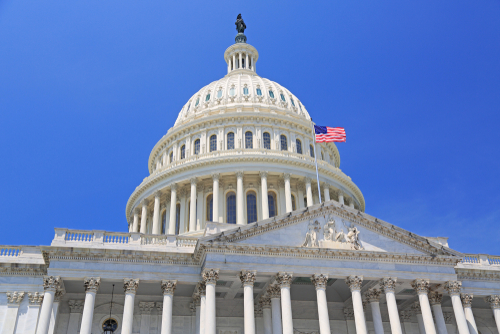
U.S. Chamber of Commerce Executive Vice President and Chief Policy Officer Neil Bradley is urging lawmakers to reach a final agreement on pandemic relief legislation that includes targeted liability protections for businesses.
“Partial agreement is better than no agreement,” Bradley said, “and it is imperative that Congress advance aid for small businesses and nonprofits, extension of unemployment programs, funding for schools and day care centers, and resources to support vaccinations before the end of the year.”
He stated that failure to pass the remaining pieces of the pandemic relief package risks the permanent loss of tens of thousands of small businesses, fosters financial hardship for millions of Americans, and creates unnecessary delays in combatting the pandemic.
Bradley specifically applauded the efforts of U.S. Sens. Rob Portman (R-OH) and Joe Manchin (D-WV), who joined 11 other bipartisan legislators in co-sponsoring two COVID-19 emergency relief bills, one of which included temporary, targeted liability protections for entities working within state and federal health guidelines during the pandemic.
“The Portman-Manchin proposal required significant compromise on both liability protections and state and local aid. It should become law,” Bradley said.
The Bipartisan State and Local Support and Small Business Protection Act of 2020 would provide $160 billion in funding for state and local governments and liability protections for businesses, schools, healthcare providers, and other organizations. It would also establish a nationwide gross negligence standard COVID-19 exposure, medical malpractice, and workplace testing claims, while protecting public accommodations that take measures to protect against COVID-19.
“The Senate should not adjourn until we have passed a new COVID-19 package to provide the relief Americans need, and I’m pleased to announce this bipartisan effort with my colleagues,” Portman said. “The [State and Local Support and Small Business Protection Act] is focused on ensuring that state and local governments have the funding they need to provide essential services while protecting businesses, nonprofits, schools, and faith-based organizations from frivolous lawsuits.”
Liability protections provided for in the legislation would apply only to claims arising from injuries that occurred from December 2019 through one year after enactment or the end of the coronavirus public health emergency.
“After many weeks of good faith efforts, I’m pleased we were able to reach agreement on a two-part relief package that includes emergency relief for small businesses, unemployment insurance, funding for vaccines and health care providers, as well as state and local assistance and a national liability shield for COVID-related lawsuits,” said U.S. Sen. Mitt Romney (R-UT), who served as a co-sponsor of both relief bills.
The second bill introduced this week, the Bipartisan COVID-19 Emergency Relief Act of 2020, would provide as much as $748 billion in relief to American students, families, businesses, workers, and healthcare providers during the pandemic.